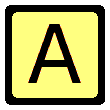 |
 |
PUNCTUATION |
|||||
|
|
|||||||
|
Capital letters
In printed material, capital letters can be used in HEADINGS, in SUB-HEADINGS, or occasionally within the body of the text to give EMPHASIS, as in this paragraph. Used thus, they can help to draw attention or give prominence to important points or key words. You should be careful to avoid excessive use of capital letters in this way (and they should NOT be used this way in academic writing).
SENTENCES should always begin with a capital letter; a fact of which most people are aware. The difficulty is in determining where new sentences should begin. We will be examining this in the section concerning full stops.
DIRECT SPEECH, where a speaker's actual words are being quoted, always begins with a capital letter.
Tom said, "We will meet you tonight at eight." "We will meet you tonight at eight," said Tom. Alice whispered, "I think you should go home now." "I think you should go home now," whispered Alice.
However, you should note that direct speech which is split into parts may only require a single capital letter.
"We will meet tonight," said Tom, "at eight." "I think," whispered Alice, "you should go home now."
As a guide, it is useful to think of the direct speech as a sentence within a sentence, thus requiring its own capital letter (at the beginning of the sentence).
The PRONOUN "I" is always written with a capital letter wherever it occurs in the sentence, even if it is run together in a contraction (I'm, I'd, I'll, I've, etc.)
I am going away at the weekend. My mother said that I should not go. I'd rather stay at home.
PROPER NOUNS always begin with a capital letter. Proper nouns are the names of particular people, places or certain types of object.
For example:
First names: Charles, Elizabeth. Surnames: Churchill, Obama. Titles: Mrs Simpson, Sir Arthur Conan Doyle. Organisations: Hull University, Hull City Football Club. Countries: France, Spain. Adjectives derived from countries: French novels, Spanish hotels. Cities and towns: Leeds, Cottingham. Street names: Park Avenue, High Street. House names: Victoria House, Sea View. Geographical features: Mount Everest, River Hull. Days and months: Wednesday, April. Festivals: Christmas, Succoth. Religions and deities: Judaism, Sikhism, God, Allah. Historical periods: the Reformation, the Renaissance.
However:
Although the capital letter is used when referring to a particular holder of a title, it may be dropped if the use is non-specific.
Sherlock Holmes was accompanied by Doctor Watson. I was making a cup of tea when the doctor called.
Sometimes national connections have become part of the language and may not require a capital letter.
india rubber brussels sprouts french windows
If in doubt, consult a dictionary.
Although days and months take capital letters, the seasons do not.
spring, summer, autumn, winter.
TITLES of books, newspapers, plays, films, songs, poems, etc. are identified by using a capital letter for the first word and (usually but not necessarily) all other important words in the title.
"I Wanna Hold Your Hand" "Theories and Approaches to Learning"
POEMS were traditionally written with a capital letter at the beginning of each line but a number of modern poets have abandoned this convention. You should follow the style used by the writer.
|
|||||||
|
Introduction - Capital letters - Full stops - Question Marks - Exclamation marks - Abbreviations - Contractions - Commas - Speech marks (Quotation marks - Inverted comas) - Possessive apostrophes - Colons - Semi-colons - Brackets - Hyphens - Dashes - Obliques (slashes)
|
|||||||
|
|
|||||||
